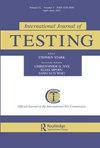Introduction to International Journal of Testing special issue on equity and fairness in testing and assessment in school admissions
IF 1.4
Q2 SOCIAL SCIENCES, INTERDISCIPLINARY
引用次数: 1
Abstract
Across the globe, educational tests are used for admissions decisions to competitive colleges, universities, high schools, and other programs. The high stakes associated with these tests have important consequences for students, and performance on them can determine whether students reach their academic and career aspirations. For this reason, their use is both widespread and contentious. Recently, the debates over the use of standardized tests in college and graduate admissions has increased, due in large part to concerns about score disparities resulting in disparate admissions outcomes. The International Journal of Testing has published many examples of criticisms and research with respect to admissions testing around the world, including in Chile (Ramirez et al., 2020), Israel (Rapp & Allalouf, 2003), Saudi Arabia (Tsaousis et al., 2018), Sweden (Wiberg & von Davier, 2017), and the United States (e.g., TalentoMiller, 2008). In the U.S. and Chile, public outcry against disparate outcomes for certain groups of students have marshaled in changes in admissions testing programs and the policies associated with them (Koljatic et al., 2021). In the U.S., several colleges and universities have suspended the SAT and ACT requirements for their applicants, which generated a number of heated discussions both within and outside academia. The use of the Graduate Record Examinations (GREs) in graduate admissions is also being hotly debated for similar reasons, and a number of graduate programs in the U.S. have opted to remove the GRE requirement from https://doi.org/10.1080/15305058.2021.2019753《国际考试杂志》关于招生考试和评估的公平性和公正性的特刊简介
在全球范围内,教育测试被用于竞争激烈的学院、大学、高中和其他项目的招生决定。与这些测试相关的高风险对学生有着重要的影响,而这些测试的表现可以决定学生是否达到他们的学术和职业抱负。因此,它们的使用既广泛又有争议。最近,关于在大学和研究生招生中使用标准化考试的争论愈演愈烈,这在很大程度上是因为人们担心分数差异会导致不同的招生结果。《国际考试杂志》在世界各地发表了许多关于招生考试的批评和研究实例,包括智利(Ramirez et al.,2020)、以色列(Rapp&Allalouf,2003)、沙特阿拉伯(Tsaouss et al.,2018)、瑞典(Wiberg&von Davier,2017)和美国(例如,TalentoMiller,2008)。在美国和智利,公众对某些学生群体不同结果的强烈抗议导致了招生测试项目及其相关政策的变化(Koljatic等人,2021)。在美国,几所学院和大学已经暂停了对申请人的SAT和ACT要求,这在学术界内外引发了一些激烈的讨论。出于类似的原因,研究生入学考试(GRE)的使用也受到了激烈的争论,美国的一些研究生项目选择从https://doi.org/10.1080/15305058.2021.2019753
本文章由计算机程序翻译,如有差异,请以英文原文为准。
求助全文
约1分钟内获得全文
求助全文
来源期刊

International Journal of Testing
SOCIAL SCIENCES, INTERDISCIPLINARY-
CiteScore
3.60
自引率
11.80%
发文量
13
 求助内容:
求助内容: 应助结果提醒方式:
应助结果提醒方式:


